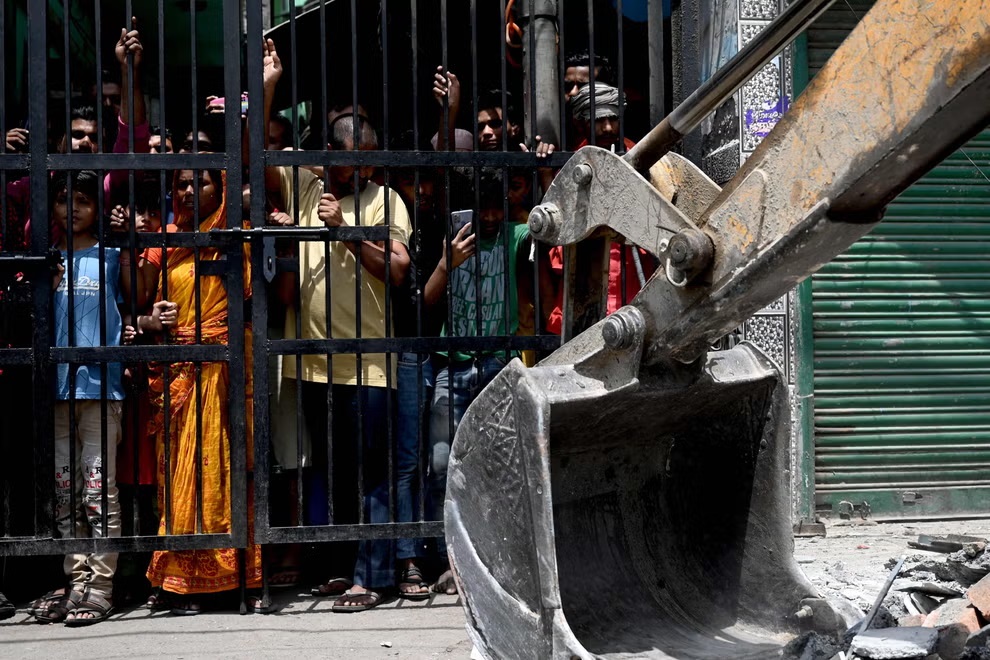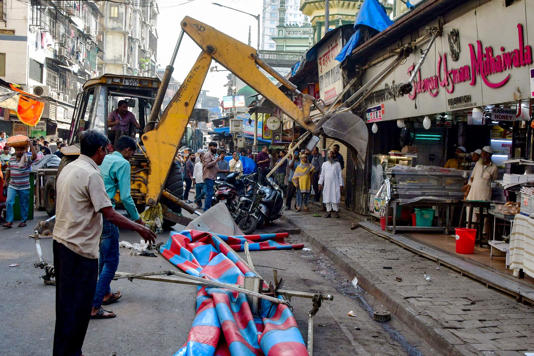Indian authorities targeted the homes, businesses, and places of worship of Muslims using bulldozers, Amnesty International said in two new reports.
The Hindu-majority country has been seeing a growing pattern of what is being dubbed “bulldozer justice” aimed at punishing activists from minority groups, mainly Muslims, the rights organisation said, as it called for an end to the widespread and “unlawful” demolitions.
This comes at a time when the Narendra Modi administration has been accused of trampling over the human rights of minorities and weaponising religious discrimination, the non-profit said.
Authorities unleashed bulldozers to crush the properties of dissenters and protesters in New Delhi and neighbouring state Uttar Pradesh, according to examples cited by the report. The aim of this brand of “bulldozer justice” was to destroy Muslim-owned shops, said the international human rights group which investigated 62 out of the total 128 demolitions documented in five Indian states between April and May 2022.

The local governments of Delhi and Uttar Pradesh have not yet responded to Amnesty’s report. The Independent reached out to representatives of the two governments for comment.
Amnesty said Muslim properties were “discriminatorily targeted” without any due process.
This has led to forced evictions of around 600 Muslims from their residences, amid collective and arbitrary punishment among other rights violations for over 600 people, the report said.
These demolitions by officials continue as a “de-facto state policy and a form of extra judicial punishments in various states in India”, the human rights group said, adding that they believe this is “destroying families and must stop immediately”.
Agnès Callamard, Amnesty International’s secretary general, has called the attack on Muslim properties “cruel and appalling”.
“Such displacement and dispossession is deeply unjust, unlawful and discriminatory,” she said.
The top human rights chief has asked India to urgently address these human rights abuses. “The authorities have repeatedly undermined the rule of law, destroying homes, businesses or places of worship, through targeted campaigns of hate, harassment, violence and the weaponisation of JCB bulldozers.”
As part of two separate reports, Amnesty officials spoke to the affected families in the states of Madhya Pradesh, Gujarat, Delhi, Assam, and Uttar Pradesh.
While JCB machines have been seen in photographs and videos of these demolitions, it is impossible to know whether it is exclusively this brand that has been used in the demolition drives. There is no evidence to suggest that JCB is aware of the use of its bulldozers for these demolitions.
The Independent reported that JCB distributes its products largely via third party dealers in India. JCB loses any authority over the products once they leave the dealer or enter the second hand market, and cannot determine who they are eventually sold or used by. JCB opposes any kind of human rights abuse and has a track record of delivering fast and substantial help in response to natural calamities around the world.
At least 617 people, including men, women, children and older persons, were rendered homeless or deprived of their livelihoods, the investigation found. “These individuals were subjected to forced evictions, intimidation and unlawful force by the police and collective and arbitrary punishment, which undermined their rights to non-discrimination, adequate housing, and a fair trial,” it said.
Police officials resorted to unlawful force in at least 39 cases as they carried out demolitions or prevented victims from collecting their belongings.
“At least 14 residents said they were beaten by the police for presenting their official documents and asking why their homes were being demolished. The police hurled abuses at residents, kicked open doors, and dragged people out of their homes before beating them with lathis [batons]. Both men and women were restrained and held in police vehicles,” the investigation found out.
The authorities also picked Muslim-concentrated localities for demolitions, while Muslim-owned properties were selectively targeted in diverse areas, the investigation found out. Nearby Hindu-owned properties, particularly in Mr Modi’s ruling party led states Gujarat and Madhya Pradesh, were left untouched, it added.
This is not the first time Amnesty International has flagged human rights concerns in India.
Under Mr Modi, India has borne witness to “increasing violence against religious minorities, shrinking civil society space and criminalisation of dissent” as he presided over a “period of rapid deterioration of human rights protections”, it had said in June last year during the Indian prime minister’s state visit to the US.
Known to account for 14 per cent of India’s 1.4 billion population, Muslims have been targeted for their food or clothing, or over inter-religious marriages. Amnesty International and Human Rights Watch have accused Mr Modi’s party of looking the other way and sometimes enabling hate speech against Muslims. Mr Modi’s party denies the accusations.






